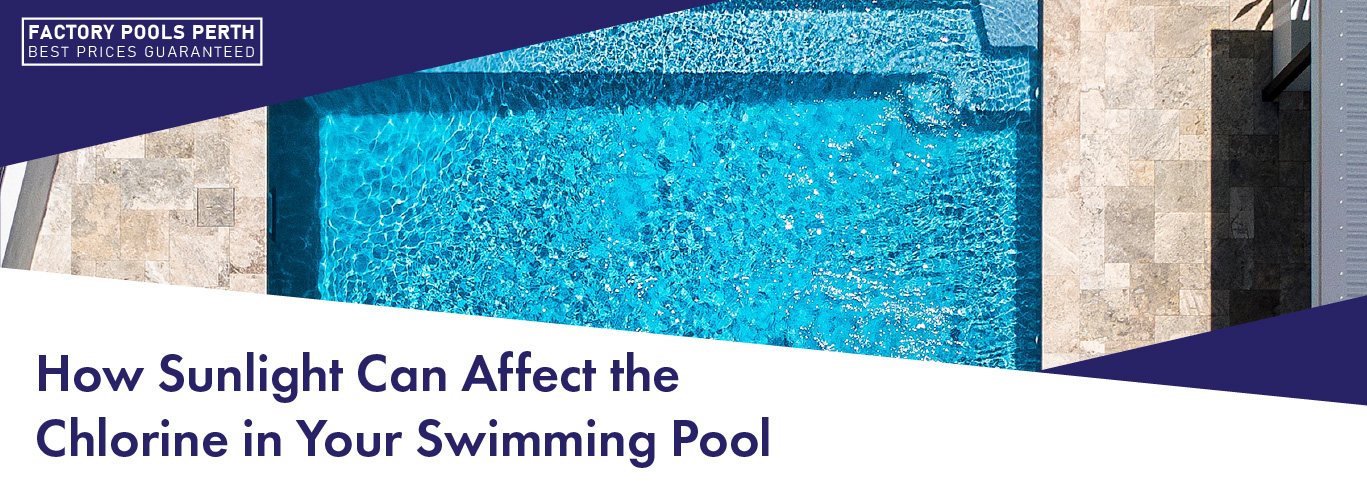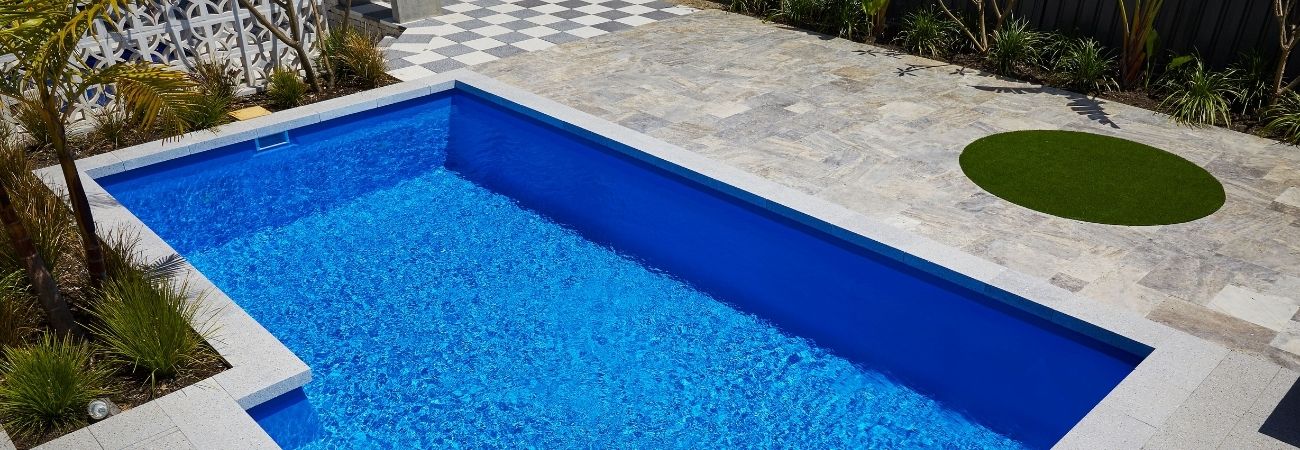How Sunlight Can Affect the Chlorine in Your Swimming Pool
Keeping your pool water clean is essential not only so it looks nice but to keep swimmers safe. A swimming pool is constantly exposed to the elements. One of them is the sun, and it can have a detrimental effect on the chlorine in your pool. Here’s how.

Chlorine explained
Why do pools need chlorine?
Chlorine is highly effective at killing harmful and infectious microorganisms such as viruses, E. coli, salmonella, and bacteria. It keeps the water hygienic.
What are healthy chlorine levels for a pool?
The ideal chlorine level can vary depending on the type of pool you have, but generally, anything between 1ppm and 3ppm is considered healthy. Always follow the dosage recommendations outlined in your user manual if you are unsure or seek advice from a professional pool cleaner.
How often does chlorine need to be added to the pool?
On average, chlorine should be added to the pool 2 times per week however, when the weather is warm or when the pool has been used heavily, you may need to add more chlorine than normal to keep the water clean. In summer, you will need to shock the pool at least once a week to prevent the water from going green or cloudy.

Not all chlorine is good for your pool
Clearing up a dirty pool requires more than just a high dose of chlorine in most instances. Chlorine can eradicate contaminants in the water, but it can’t do this when there are excessive amounts. The chlorine you add to your pool is free chlorine, and this is good chlorine, but when the water is filled with excessive contaminants, the chlorine binds to these and becomes ineffective. This is called combined chlorine. It’s unlikely you’ll see any improvement in your water quality, and it will go green fast when your chlorine has converted to this state.
What effect can the sun have on free chlorine?
The sun can inhibit the free chlorine from working properly, but how? The sun’s UV rays break down the chlorine, and it is released into the atmosphere. In summer, when the sun is bearing down, it’ll only take around two hours for 90% of the chlorine in your pool to be broken down completely.
How can I prevent the sun from breaking down the chlorine in my pool?
There are a couple of simple ways you can stop the sun from degenerating the free chlorine in your pool, including:
Using a stabiliser
Pool stabiliser aka cyanuric acid is an essential pool chemical. Without it, it would be very expensive and tiresome trying to keep your pool clean. It works by attaching itself to the chlorine and stabilising it making it more resistant to UV radiation. It slows down the rate that the chlorine breaks down, and therefore it is effective for far longer. It can help the chlorine last up to 8 times longer. There are a couple of different types of stabilisers including one that’s pre-added to chlorine, it also comes in granular form and liquid. The amount of stabiliser your pool needs can differ depending on the size of your pool and the kind of pool you have. If you are not sure of the recommended dose for your pool, refer to your user manual or speak to a professional for guidance. Overdosing or underdosing your pool with chemicals can have an adverse effect on your equipment, and it can make the water unsafe to swim in.

What if I've added too much stabiliser, does it matter?
In short, yes it does. Adding too much stabiliser will cause the chlorine molecules to lock, and they then become ineffective. To fix this problem, you’ll need to dilute the water by adding fresh water. You may need to empty the pool a bit before refilling it.
Buy a pool cover
Pool covers are undoubtedly one of the best investments you can make for your pool. They can help to prevent UV rays from breaking down the chlorine in your pool by blocking them from entering the water. Your chlorine can remain at its optimal concentration and can successfully sanitise the water as it should. This can save you a considerable amount of money and effort by using it when the pool is not in use.
Test chlorine levels regularly
Testing your chlorine and chemical levels often allows you to see to any slight imbalances before they become big ones. It ensures your pool water stays nice and clean and doesn’t get excessively dirty. Once the pool has more combined chlorine than free chlorine, it doesn’t take long for the water quality to be compromised, and this happens at an even faster rate when the weather is hot.
Top up the chlorine when the weather is warm
As we touched on earlier, you may need to top your chlorine up when the weather is warm, this is because the sun heats the water up, and this can have a negative effect on your free chlorine. It is also perfect conditions for algae and bacteria to prosper. Topping your chlorine up will prevent your free chlorine from turning into combined chlorine.

Install your pool indoors
An indoor pool isn’t for everyone, but if you do install your pool via this method, you won’t have to worry about the sun breaking down your chlorine at all. It also has other benefits such as, eliminating leaf litter, debris, and rain etc from falling into the pool, all of which can affect your pools delicate chemical balance. Swimmers also don’t have to worry about sunburn. If an indoor pool installation doesn’t work for you, consider implementing some form of shade over your pool. It doesn’t have to cover the entire pool; some shade is better than none.
Darker coloured pools may promote faster chlorine breakdown
Darker coloured pools tend to absorb more heat than lighter ones, and as a result, the water is typically warmer. This can increase the rate that the chlorine is broken down, but a warmer one can be more comfortable to swim in when the weather starts to cool down, so they do have their pros and cons. If you have a high-quality cover, the pool colour is irrelevant.
We hope this post has given you an idea of how the sun can affect your chlorine levels and how to prevent UV rays from inhibiting the chlorine in your pool. Testing your water is the easiest way to know where your chlorine and chemical levels are at and checking them often will ensure your pool stays nice and clear year-round before it has a chance to go cloudy or green. If pool maintenance isn’t up your alley, it’s a good idea to hire a professional pool cleaner to look after it for you. That way your pool will stay clean, your swimmers are safe, and your equipment is protected from preventable damage. If you would like any additional information on this subject or would like to discuss the suitability of one of our award-winning fibreglass swimming pools or spas for your home, contact our friendly team here at Factory Pools Perth today.

